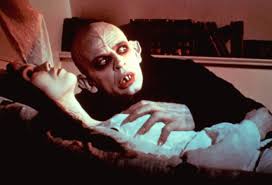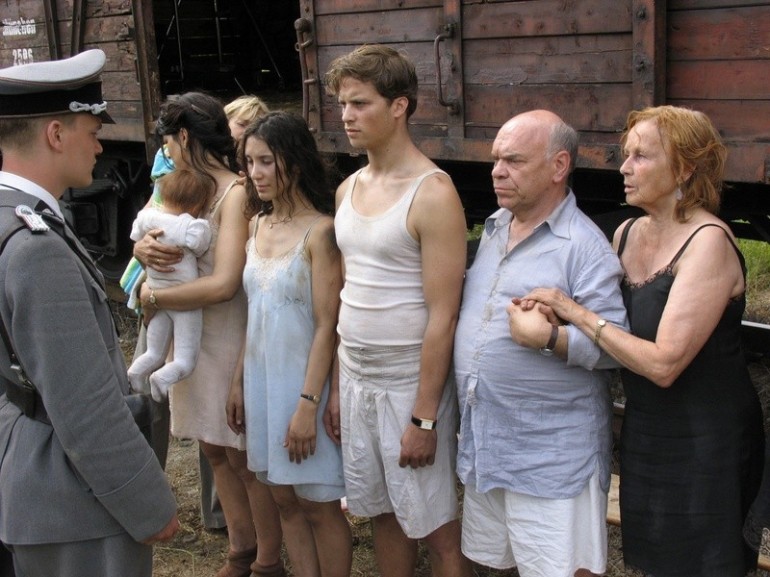
AUSCHWITZ: THE LAST JOURNEY (DER LETZTE ZUG). (2006) DIRECTED BY JOSEPH VILSMAIER AND DANA VAVROVA. STARRING GEDEON BURKHARD, LALE YAVAS, LENA BEYERLING, SIBEL KEKILLI, ROMAN ROTH AND LUDWIG BLOCHBERGER.
REVIEW BY SANDRA HARRIS. ©
‘Hey, don’t feed the animals…!’
This German language film is an absolute masterpiece, utterly compelling but undoubtedly grim viewing at the same time. It’s an historically and factually accurate depiction of the dreadful journey of one of the Holocaust trains transporting Jews to Auschwitz, as seen from the viewpoints of two or three specific little families or couples.
The journey starts at home, with the inevitable tramp of booted feet on the quiet streets outside in the middle of the night. Then it’s ‘Open up, it’s the Gestapo!’ and the terrified Jews, the last few Jews left in Berlin, have only five minutes to pack their things and get downstairs to the waiting trucks and lorries.
They’re allegedly being taken to a ‘place of safety,’ because there are too many Allied bombs falling on the city. A likely story. The viewer knows that the Nazis are simply rendering Berlin ‘Juden-frei’ or ‘Jew-free’ as a ‘gift’ to Hitler for his birthday. If I may be permitted a little levity (anti-Nazi, that is, not anti-Jew!) here, what happened to the notion of giving someone a voucher and letting them pick out their own present?
At the train station, a calm voice over the tannoy tells the seven hundred Jews leaving Berlin for Auschwitz (although they don’t know that yet) not to panic. If they board the trains in a nice orderly fashion, they’ll be provided with the food and drink that will sustain them throughout the journey. This doesn’t sound so bad, the waiting crowds tell themselves.
Some children question why they’re to travel in cattle cars when they’re not cattle, they’re people, but their mothers hush them and remind them that, after all, it’s wartime. Some of the Jewish men, suspecting correctly where they’re being taken, resolve even at this stage to work together to escape the trains once they’ve boarded.
Once the doors to the train have been bolted and the Jews are ‘safely’ aboard, all pretence at politeness on the Germans’ part will cease and the Jews will realise that they’ve been duped. Though they still haven’t been told precisely where they’re going, they can guess. Now will begin the most horrific journey of their lives, and even then it’s still not as bad as their awful destination.
One hundred people crushed into one cattle car. One bucket of water for them all to share, and no food except what they’ve managed to bring themselves. Another bucket for toilet purposes. Men, women, old people, children and babies all steaming in the heat and breathing the same foul, fetid air. One tiny barred window and a locked and bolted door.
The Jews are deemed to need so little care once they’ve been securely locked inside the cattle cars that the Nazi powers have given the job of commander to a young boy of barely twenty, an Oberleutnant Crewes.
This baby-faced Nazi, however, is already full of the poison and cruelty inculcated into him by his elders, so the Jews needn’t expect any mercy from this quarter. As the train stokers say: ‘These young ones are full of this whole Aryan race shit, as if the Virgin herself had personally whispered it into their ears.’
Conditions inside the cattle car quickly become unbearable as the train trundles rather than hurtles its way through Hitler’s Germany, the countryside of his Third Reich, to Auschwitz in Poland.
There are long delays too, for example when they have to sit back and allow precedence to the trains filled with German soldiers rushing to the Front, and another time while a gallows is being built to hang a group of partisans and leave them hanging, as a grim warning to all who see them.
During these interminable delays, the cry is all for ‘Wasser, bitte!’ as the occupants of the cattle car beg for a little water to ease their raging thirst. Sometimes they get it, sometimes they don’t. They hand their valuables out the window to the train operatives in return for water and a bit of bread. They’ll lick the water up off the floor of the cattle car if they have to.
Let’s meet our main protagonists. Henry and Lea Neumann, a handsome young couple, are here with their young daughter, a remarkably clever and brave little girl called Nina, and their baby son David.
Albert Rosen and Ruth Silbermann are a young engaged couple who are so in love with each other it’s lovely to see. Ruth has a lot of character and guts and she’ll make Albert, a former jeweller, a marvellous wife, a wife he can be proud of.
Jakob and Gabrielle are an elderly couple, devoted to each other and with balls and chutzpah to spare. Jakob has been a comedian and entertainer all his life. When the Gestapo and the sinister man in the trenchcoat give him five minutes to pack his most valuable possessions, he brings his collection of jokes and the tuxedo he wears to perform in.
Gabrielle is his pianist. She has as much courage as the diminutive Jakob who, before this awful train journey happened, tried to persuade his beloved to emigrate to America. She refused to leave him, however, so now they’re both here.
The staunchly good-humoured old couple use their talents and entertainment skills to try to keep up morale in the stifling cattle car, in which people are already dying of dehydration and shock and everyone’s stripped down to their underwear in the intense heat.
Henry and Albert are the two men who try to engineer escape from the train of certain death. If they don’t manage it for anyone, then this train will one day pull up at Auschwitz.
There’ll be barbed wire, attack dogs, endless shouting and doing everything ‘on the run’ the way the Nazis preferred it. There’ll be the infamous ARBEIT MACHT FREI, which might just as well read ABANDON HOPE, ALL YE WHO ENTER HERE, as in the workhouses of old.
There’ll be ‘men to the left, women and children to the right’ and grey-faced Sonderkommandos pulling and pushing them into the correct lines before the Nazis get angry. The new arrivals might see the chimneys that are kept alight night and day and belch out smoke and a peculiar-smelling ash round the clock.
Some of the new people may have heard of these chimneys and their grisly purpose. ‘It can’t be true,’ they tell themselves as they look up, wide-eyed. ‘How can it be true? It doesn’t make any sense, the Nazis destroying their own workforce!’
If it sounds like hell to the reader, well, one can’t even imagine what it was like for the people who were brought here. The film’s ending is one you won’t forget for a long time. It’s even sadder than the little vignettes of our main protagonists’ former happier lives which are cleverly interspersed throughout the film.
I’m not one to preach but, if ever a film could represent a cogent argument against racism, then this film would have to be it. Every time I watch it, it makes me feel ashamed of my nice cushy life in one of the so-called ‘civilised’ countries. And you’ll certainly never waste a drop of water in your life again after seeing this. I guarantee it.
AUTHOR BIOGRAPHY OF SANDRA HARRIS.
Sandra Harris is a Dublin-based novelist, film blogger and movie reviewer. She has studied Creative Writing and Film-Making. She has published a number of e-books on the following topics: horror film reviews, multi-genre film reviews, womens’ fiction, erotic fiction, erotic horror fiction and erotic poetry. Several new books are currently in the pipeline. You can browse or buy any of Sandra’s books by following the link below straight to her Amazon Author Page:
http://www.amazon.com/-/e/B015GDE5RO
You can contact Sandra at:
https://www.facebook.com/SandraHarrisPureFilthPoetry
https://sandrafirstruleoffilmclubharris.wordpress.com
http://sexysandieblog.wordpress.com
http://serenaharker.wordpress.com
https://twitter.com/SandraAuthor

